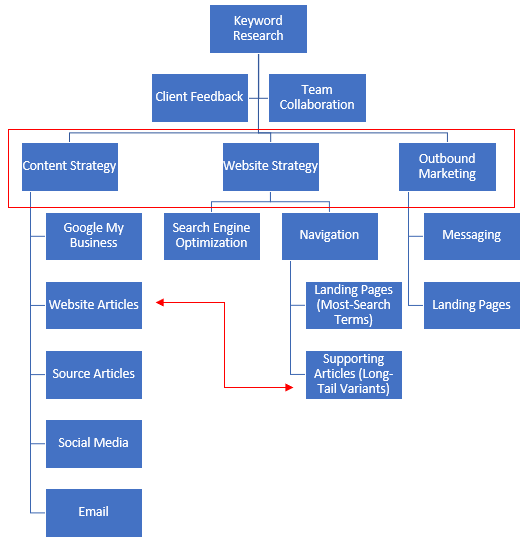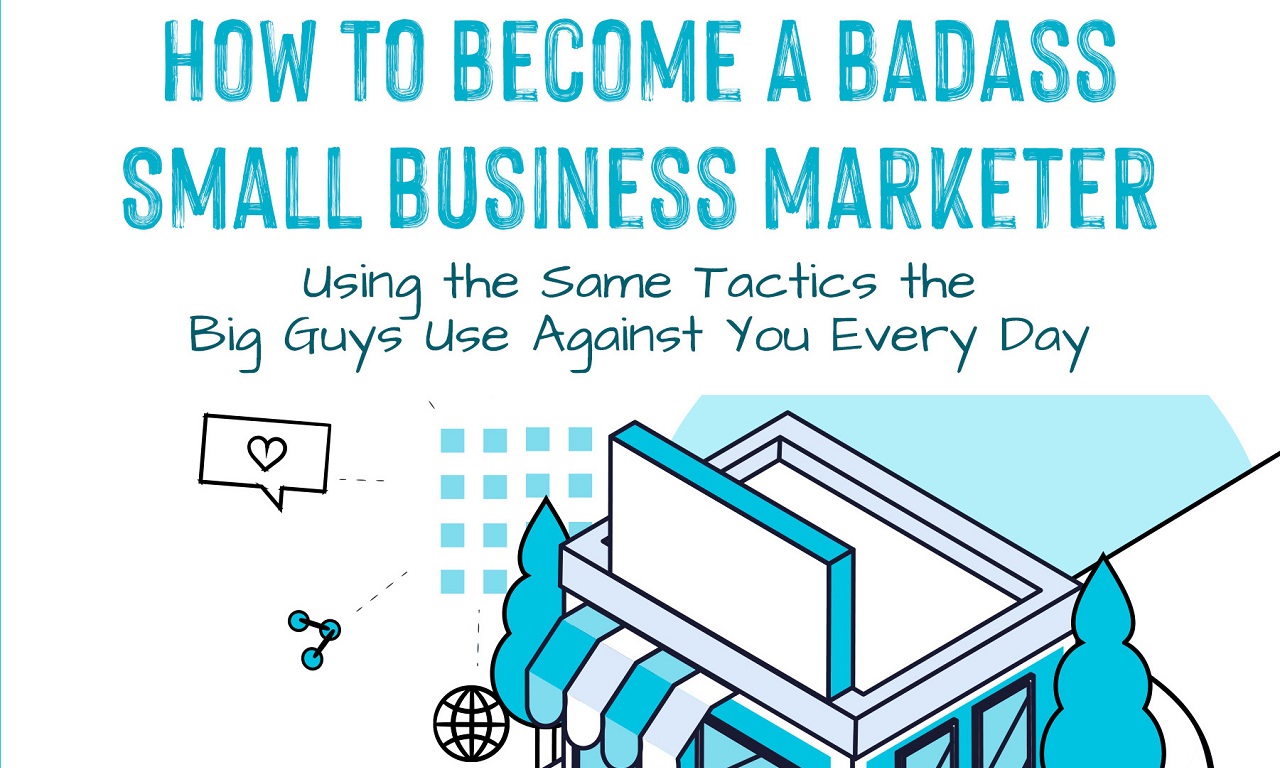Six Steps to Better Keyword Research Utilization
Today, we’re sharing our Six Steps to Better Keyword Research Utilization, as part of a week that’s had a lot of focus here in our Local Marketing Blog on keywords.
Why so much talk about keywords? Well, search — in all its current forms, but also the future of search — is how we find things in the digital age. And that includes businesses like yours, and your competitors.
So, to a growing extent, the battle can be won or lost at the discovery stage. After all, if you’re not findable, you won’t create awareness — the first step in the journey every new customer takes to become a customer.
Why Keyword Research Drives Our Entire Process
It’s not the ONLY thing; in fact, it’s just one of many. But keyword research is a critical part of our process for developing marketing strategy for any client. We can visualize it’s impact on our process here at Source Local Media this way:

Steps to Better Keyword Research – Step 1
You’ve got to do the research. Seems obvious, but so many people just assume what people type into the search engine and go from there. Mistake.
Many, many times we are surprised by at least a few things we find in the research. In fact, we often find little gems we refer to as “long tail searches” that are low-volume searches, BUT extremely high-potential for creating a new customer.
If you’ve never looked at keywords related to your business, there are some free ways to get started, such as MOZ.
 Step 2: Collaboration
Step 2: Collaboration
Once we’ve got our keyword research, we break it down into:
- Core Terms. These are the most-used terms, and they tend to be the most general ways of talking about your product or service. And, most likely, these are the most competed-for terms.
- Long-Tail Variants. These are the juicy little morsels that tend to be lower-volume searches, BUT highly-indicative of someone who is “in market” for what you offer.
- Negative Keywords. These are words or phrases that are indicative of searches you DON’T want. For example, if you are a high-end business negative keywords would typically be cheap, cheapest, affordable, etc. But there are also sometimes words that can have double meaning, such as pool (people could be searching for a pool table, or a backyard pool, or a host of other things).
This takes collaboration between the professional marketers and the leadership team of the business. Because, together, we can remove keywords that are a waste of effort. And we can identify those variants that are extremely desirable.
Remember, Google’s intent is to get searchers to the best result the fastest. So the more we understand when and where we should/can be the “best result,” the more likely we are to be successful.
Step 3: Planning Integration
This research clearly becomes the basis for SEO strategy. Read more about Search Engine Optimization here.
But we can use it for so much more. It can inform other key aspects of our overall marketing strategy. As we continue through the steps to better keyword research utilization, you’ll see how this integration plays out.
Step 4: Content Strategy
Any modern marketing strategy has a content strategy component. And keyword research helps us create a roadmap for building content that will best relate to our target audience.
 We most commonly build landing pages that relate to the core terms (the most-searched phrases related to our products or services). Then, we create a schedule to publish posts related to long-tail variants. And those posts get aggregated to the corresponding landing pages.
We most commonly build landing pages that relate to the core terms (the most-searched phrases related to our products or services). Then, we create a schedule to publish posts related to long-tail variants. And those posts get aggregated to the corresponding landing pages.
All of this content also gets posted to your social media and your local directories, and is useful if you publish an email newsletter, or use similar tactics.
It might sound a bit complicated. But it’s not. If you’d like to talk about how this would work for your business, we offer a free initial marketing consultation. Just schedule time with our team, and we can walk you through the process.
Step 5: Website Strategy
Building on Step 4, let’s talk more about the relationship between landing pages, posts, and how to get the most bang for your buck out of all that effort.
Landing Pages. This is where you are talking generally about a product or service. Let’s use residential roofing as an example. First off, keywords tend to fall under two ideas: repair, and replacement. So we would have one landing page optimized around “residential roofing repair” and another optimized around “residential roofing replacement.”
Posts. There are a million variations of how people talk about these core terms. There are types of roofing (asphalt, metal, shingle, etc.). Then questions like cost, time, etc. These are all potential posts.
Distribution of Posts. Once those posts exist, they are useful in a number of ways:
-
-
-
-
-
- Promotion on the Website
- Posting to Social Media
- Posting to the Google Business Profile
-
-
-
-
Posts are great. But if no one sees them, they can’t do their jobs for you. There’s no point building content no one will see.
Step 6: Impact on Outbound Marketing
Lastly, keyword research can inform how we design and execute outbound marketing strategy.
Here’s a real-life example. Go back to our residential roofing plan…
We realized people searched “repair” much more than they searched “replacement.” Even though it’s often difficult to repair a roof, people want to believe they don’t need to replace their roof. So they search for repair.
An outbound advertising campaign was doing well promoting a “free estimate.” But we realized people didn’t want to go straight to a replacement quote. They wanted to know, definitively, that repair wasn’t an option. So we replaced “free estimate” with “free inspection,” and immediately the actionable lead count went up 34%.
Our digital advertising had nothing to do with search. But by relating to people based on how they choose their words in search, we hit gold.
To illustrate this, check out our basic marketing formula. What we say in advertising should never be an afterthought. And in this case, relating to the way people think — which we learned from keyword research — took a good campaign and made it great.
More Help with Keyword Research
We hope these steps to better keyword research utilization have given you something to think about it. If you’d like to talk more about it, we’re always willing to invest in our clients before they invest in us. Just schedule a free initial marketing consultation with our team.
We use such introductions as a chance to get to know you and your business better, understand the challenges that are keeping you from growing faster, and share our expertise to help you make a plan.
If you’d just like to see more articles like this one, get our free e-mail newsletter about Local Marketing so we can stay in touch.
Thanks for visiting today!






